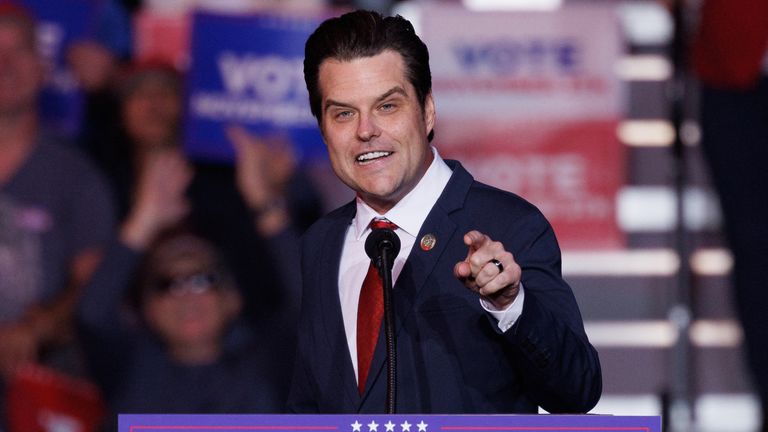In a stunning move, President-elect Donald Trump has announced his nomination of Rep. Matt Gaetz of Florida as the next Attorney General, setting the stage for a potentially explosive confirmation battle. Gaetz, known for his unwavering loyalty to Trump and his combative style in Congress, has a reputation for being one of the most outspoken and controversial figures in the Republican Party. The nomination, which comes as Trump prepares to take office in 2025, is seen as part of his broader strategy to install allies in key Cabinet positions who can aggressively advance his policy agenda.
Gaetz’s nomination was met with immediate backlash from Democrats and some Republicans, who voiced concerns over his suitability for the role. As a member of the House Judiciary Committee, Gaetz has been a vocal critic of the Biden administration and has called for sweeping reforms within the Department of Justice (DOJ). However, his political career has been marred by a series of legal controversies and ongoing ethics investigations, casting a shadow over his potential confirmation.
Trump’s announcement came via social media, where he praised Gaetz as a “tenacious attorney” who will bring much-needed change to the Justice Department. “Matt will end weaponized government, protect our borders, dismantle criminal organizations, and restore Americans’ faith in the DOJ,” Trump wrote. Gaetz responded enthusiastically, declaring on X (formerly Twitter), “It will be an honor to serve as President Trump’s Attorney General!”
The decision to nominate Gaetz marks a significant departure from Trump’s previous picks for the role, such as Jeff Sessions and Bill Barr, both of whom had extensive legal careers before their appointments. Gaetz’s limited legal experience and his controversial past have already become focal points of criticism. Senate Republicans, including some of Trump’s key allies, have expressed surprise at the choice, with many suggesting that Gaetz will face a difficult path to confirmation.
House Speaker Mike Johnson confirmed that Gaetz had submitted his resignation from Congress effective immediately, a move necessary to pursue the Attorney General position. Johnson, who was reportedly caught off guard by the resignation, stated, “It came as a bit of a surprise, but he felt it was the right time given the GOP’s slim majority in the House. I’ve already spoken with Governor DeSantis about expediting the process to fill Gaetz’s vacant seat.”
The road to confirmation for Gaetz is expected to be tumultuous. The bipartisan House Ethics Committee has been investigating allegations against him, including claims of sexual misconduct, illicit drug use, and obstructing government investigations. Although a separate Justice Department probe into sex trafficking allegations against Gaetz was closed last year without charges, the lingering ethical concerns could complicate his Senate confirmation hearings.
Democratic lawmakers have signaled that they intend to scrutinize Gaetz’s past during the confirmation process. “This is not a serious nomination,” said Sen. Lisa Murkowski of Alaska. “We need an Attorney General who can restore integrity to the DOJ, not someone embroiled in ongoing investigations.” GOP Sen. Kevin Cramer of North Dakota added, “He has to answer for those allegations, whether they’re legitimate or not.”

Despite the controversy, Gaetz’s supporters argue that his appointment could be a game-changer for the Justice Department, aligning it closely with Trump’s vision of a more aggressive stance on immigration, crime, and federal oversight. Trump’s allies have called for sweeping changes within the DOJ, including mass deportations, regulatory rollbacks, and potential pardons for January 6th defendants. Mark Paoletta, a prominent Trump advisor, stated, “The DOJ needs to be fully committed to implementing President Trump’s policies or they should leave.”
Gaetz’s appointment is part of a broader reshuffling of Trump’s Cabinet, which also includes the nominations of Sen. Marco Rubio for Secretary of State and former Rep. Tulsi Gabbard as Director of National Intelligence. The choice of Gaetz, Rubio, and Gabbard underscores Trump’s preference for loyalists over traditional, experienced candidates, signaling a potential shift in how his administration intends to govern.
If confirmed, Gaetz would oversee a Justice Department still grappling with investigations from the previous administration, including probes into former President Biden, his son Hunter, and Trump himself. The role of the Attorney General would give Gaetz significant influence over ongoing federal cases, raising concerns about potential conflicts of interest. Trump’s critics worry that placing a close ally like Gaetz at the helm of the DOJ could erode the department’s independence and lead to politically motivated actions.
As the confirmation process begins, all eyes will be on the Senate to see whether Gaetz can overcome the hurdles posed by his past controversies and secure the role of Attorney General. The stakes are high, not only for Gaetz but also for the future direction of the Justice Department under Trump’s renewed leadership.




